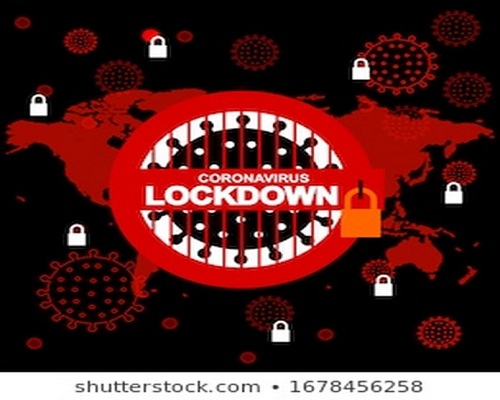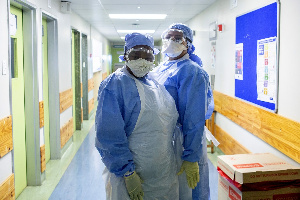Lockdown level 4: What will be allowed

- The new rules and regulations for South Africans under lockdown level 4 from May were released on Saturday.
- Masks will become compulsory, the sale of certain non-essential items will be allowed, and a national curfew enforced.
- Fast food will be allowed – but delivery only.
- For more stories go to www.BusinessInsider.co.za.
From 1 May, South Africans will be allowed to buy clothes and cigarettes, and order fast food.
A number of businesses can also re-open, it was announced at a media briefing on Saturday.
South Africa will embark on a staged reopening of the economy, starting with a level 4 on the first of May, to help slow down the spread of coronavirus, and ensure that health authorities are not overwhelmed, cooperative governance and traditional affairs minister Nkosazana Dlamini-Zuma said.
A separate press briefing will be hosted on Monday to address the phased reopening of schools and universities.
These are the rules of Level 4, which will be adopted from 1 May:
Masks are obligatory
Everyone has to wear cloth face masks outside their homes. If you don’t yet have a cloth mask, you can wear a scarf or a t-shirt wrapped around your mouth and nose, says Dlamini-Zuma.
Strict curfew
People are not allowed out between 20:00 and 05:00.
No movement across provincial borders
Unless you return to work with proof of employment, are attending a funeral (with approval) or delivering essential services.
Transport:
There is a limit of three people per private vehicle, and 70% capacity in taxis. All taxis and e-hailing services such as Uber and Bolt must be sanitised daily, and hand sanitisers must be provided.
Can you visit your friends and family?
No “recreational” visits are allowed.
Can you attend church or other public gatherings?
No.
Fast food:
The sale of takeaways will be permitted for delivery only – from fast food outlets and restaurants.
Restaurants can open for food delivery services only, and only between 09:00 to 20:00.
What you can buy from a retailer or spaza shop:
- Any food product, including non-alcoholic beverages and animal food. But the sale of cooked hot food is still prohibited
- All children’s clothing
- Winter clothing for adults
- Bedding
- Heaters
- Toilet paper, sanitary pads, sanitary tampons, condoms.
- Hand sanitiser, disinfectants, soap, alcohol for industrial use, household cleaning products, and personal protective equipment.
- Personal ICT equipment including computers, mobile telephones and other home office equipment.
- Products for the care of babies and toddlers
- Stationery and educational books
- Tobacco products
- Personal toiletries, including haircare, body and face care products, roll-ons, deodorants, and dental care products.
- Medical and hospital supplies, medicine, equipment and personal protective equipment.
- Fuel, including coal, wood, paraffin and gas.
- Airtime and electricity.
- Hardware shops are still not open for the general public. Hardware, components and supplies are only on sale for qualified tradespersons solely for the purpose of emergency repairs at residential homes – as well as required for essential services.
- Components for vehicles undergoing emergency repairs where such vehicle is used by a person engaged in essential services work.
- Textiles required to produce face masks, and other personal protective equipment.
Stores have to ensure that clients’ temperatures are tested, hand sanitisers must be available and measures must be in place to facilitate social distancing.
Where the number of customers cannot be accommodated at once then measures such as a ticket system and a defined limit of time in the store per customer should be implemented instead of the physical queuing of customers.
Are you allowed to buy alcohol?
No.
Excercise:
Dlamini-Zuma said exercise will be permitted under strict conditions, but gyms or other facilities where people gather for exercise will remain closed. Gathering in groups for exercise, such as when running or cycling, will be prohibited. Further details are coming next week.
Businesses that are allowed to be open:
- Retailers, spaza shops, hardware shops and wholesalers that sold the products mentioned above.
- Construction and related services: Civil engineering for public works projects, critical public works construction, road and bridge projects and other public works civil engineering projects. Critical maintenance and repairs are also allowed.
- Agriculture, hunting, forestry and fishing: All agriculture, hunting, forestry, fishing and related services, including the export of agricultural products permitted.
- All electricity, gas and water supply companies.
- Information and communication services: All telecommunication services and infrastructure; information and communication technology services for all private and business customers; and postal services and courier services related to transport of medical products.
- Media and entertainment services: Online services; productions for local broadcast; and live streaming in support of Covid-19 subject to directions; and newspapers and broadcasting
- Financial and business services: Some call centres and essential financial services may operate.
- Private security services
- Implementation of payroll systems
- Rental of motor vehicles, machinery and equipment, and of personal and household goods to support other Level Four services.
- Other professional services may operate only where work-from-home is not possible, and only to support other Level 4 services
- Accommodation services not permitted, except for quarantine and essential services.
- Mining and quarrying: Coal production for Eskom scaling up to full employment. All other mining starting in batches scaling up towards 50% employment. Open-cast mining scaling up to full employment;
- Repair and related emergency services permitted: Tow trucks and vehicle recovery services; emergency repair work, including plumbers, electricians, locksmiths, glaziers, roof repair work.
- Emergency automobile repairs for everyone.
- Production, manufacturing, supply, logistics, transport, delivery, critical maintenance and repair in relation to the rendering of permitted services including components and equipment.
- All medical and veterinary services
- Cleaning, sanitation, pest control, sewerage, waste and refuse removal services.
- Recycling of glass, paper and metal including informal recyclers (permitted at 50% capacity)
- All social work, counselling, care and relief activities permitted
- Wildlife management, antipoaching, animal care and veterinary services
- Funeral and cremation services.
- Trade union essential staff for workers covered by Level 4.
Which manufacturing will be now be allowed?
Some manufacturing will restart, but in some cases not all employees will be allowed back at once.
Factories that produce goods that can be sold under Level 4 can return with all their staff – apart from for a couple of exceptions.
Only a quarter of the workers at manufacturers of winter clothing, bedding and heaters can return at first, but it can be scaled up to 50%.
Automotive manufacturing, including components, can scale up in phases to 50% employment, and the same applies for stationery production, as well as cement, construction materials and hardware.
Manufacturing of packaging, including glass, plastic bottles and containers is permitted to scale up to full employment, along with petroleum smelters, refineries and furnaces.
All other manufacturing can scale up to 20% employment.
Can domestic workers start working again?
Those who support everyone who is working under Level 4, as well as live-in staff can return.
Can you go to your hairdresser or nail salon?
No. Minister of trade and industry Ebrahim Patel said the risk of transmission with these services is too high.
Can you replace your ID now?
Yes. This is now allowed, and the deeds office as well as other licensing and permitting will now be open along with the provision of birth and death certificates.
Source: businessinsider.co.za





